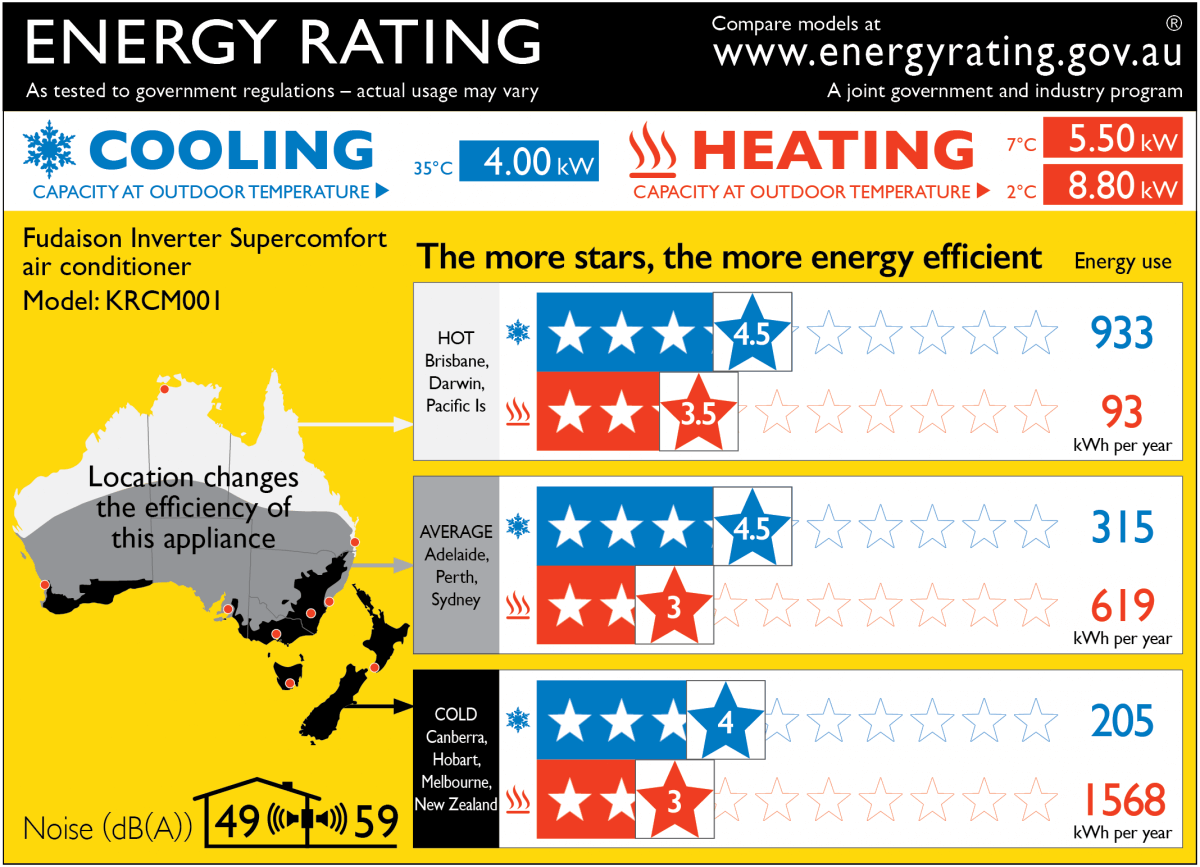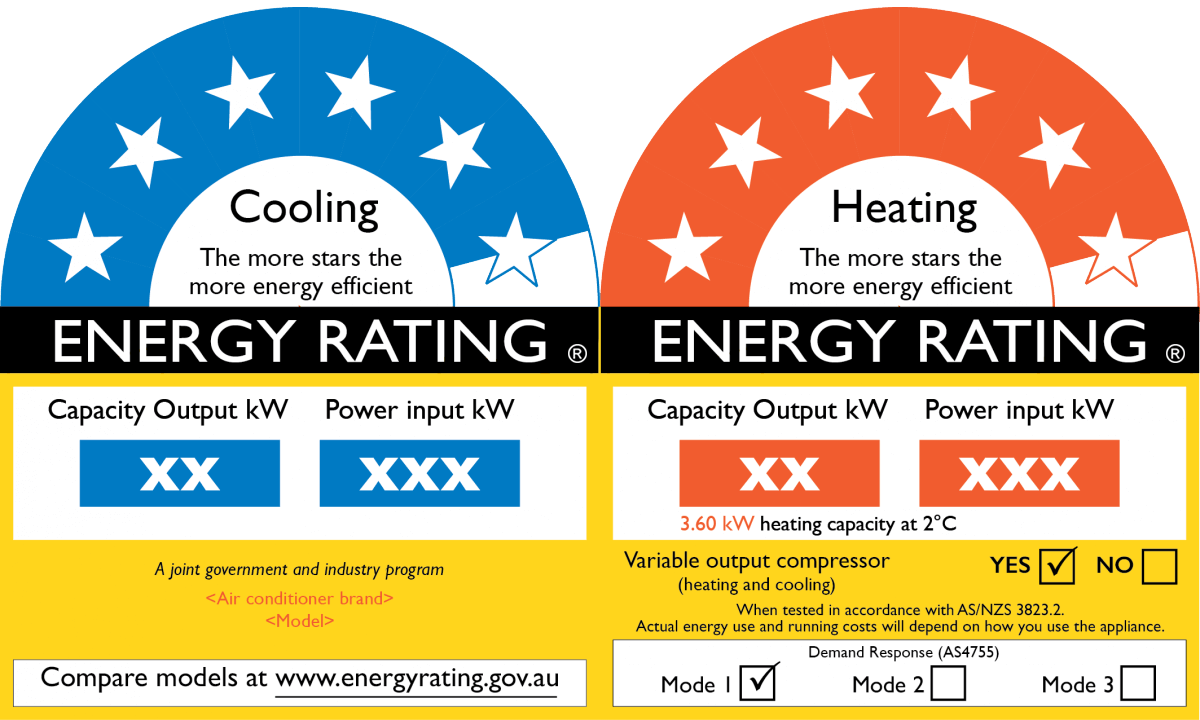KEY POINTS
- Area space and the number of people in the household can affect which type of heater is best suited to your home.
- Reverse cycle air conditioners are more efficient than standard electric heaters.
- The most energy efficient fuel type for a heater is solar, with natural gas or LPG coming in second.
Keeping your home warm is essential for getting through the winter months. But balancing your comfort in the cooler months with the inevitable rise in your energy bills can be difficult, especially if you’re unfamiliar with energy efficient heating.
This Canstar Blue article has some tips on saving on winter heating costs, as well as info on the most energy efficient heaters in 2025.
On this page:
- Different types of energy efficient heaters
- What is the most energy efficient heater in Australia?
- How does an energy efficiency rating work?
- What are the different fuel types for heaters?
- How to find an energy efficient heater
- Cheapest gas deals in your state
- Will switching to an energy efficient heater lower my energy bill?
- What else can I do to save money on heating?
- Lower your winter heating costs with a cheaper electricity plan
- FAQs about energy efficient heaters
Different types of energy efficient heaters
Choosing the right type of unit to heat your home can be based on a variety of factors, like area space and the number of people in the household.
Here is a list of the most common heater types in Australia:
- Fan heaters
- Gas heaters
- Radiant heaters
- Oil-filled heaters
- Ceramic heaters
- Convector heaters
- Electric fire heaters
- Reverse cycle conditioners
What is the most energy efficient heater in Australia?
The most energy efficient heater in Australia for your needs depends on a variety of factors, such as the room size you’re looking to heat, the type of heater, the fuel it uses and how long you’re going to use the heater on average. Some of the best-rated heaters for energy efficiency are from brands like SPT, Midea, Actron Air and Haier.
What is the most energy efficient electric heater?
The energy efficiency of electric heaters will vary depending on various factors. It’s important to research any heater that you are interested in purchasing and comparing the output against similar models.
To give you an idea of where you can start comparing, Canstar Blue has listed some examples from the latest Canstar Blue survey results for portable heaters:
- Dyson Purifier Hot+Cool™ Gen1 HP10
- Goldair Platinum 2400W Smart Wi-Fi convector heater
- DeLonghi Dragon4
- Kambrook 2000W ceramic tower heater
- Arlec CEH253 tower heater
- Kogan portable oil heater
If you would like more information on heaters, specifically portable heaters, check out Canstar Blue’s report on the best-rated portable heaters.
Energy efficient reverse-cycle air conditioners
The Energy Rating website claims that reverse cycle air conditioners are more efficient than standard electric heaters. Energy Rating suggests that the highest-rated reverse-cycle models are:
- SPT
- Haier
- Rinnai
- Midea
- Actron Air
- Galaxy Air
Each of these air conditioning models is rated based on both heating and cooling energy efficiency, and ranges from 3 out of 5 stars for heating and 7 out of 10 for cooling to 3.5 out of 5 for heating and 6.5 out of 10 for cooling.
How does an energy efficiency rating work?
For most products, an energy efficiency rating is pretty straight forward – the more stars, the more energy efficient, and the more energy efficient, the cheaper it will be to run. However, for some heating and cooling units these ratings are a little different.
From March 2019, star ratings on heaters and coolers began showing climate ratings for energy efficiency, as opposed to the simple six-star method. The new methodology looks at the seasonal energy efficiency of the unit, in each of the three climate zones as determined by the government. Created to help Australians be more energy efficient, the new system takes into account the different climates of each of the three zones and determines the impact this has on some heating and cooling options, allowing customers to pick an appliance best suited to where they live.

Gas energy ratings still follow the original star rating methodology – the more stars, the more energy efficient the appliance. An example of a standard energy efficiency label for heaters or air conditioners is below.

Not all heating products are required to display an energy efficiency label, but air conditioners are generally required to display their ratings. The following air conditioners are not required to have an Energy Rating Label:
- Ducted*
- Evaporative
- Three phase*
- Water-to-air air conditioners
- Multi-split (units with several separate indoor units each with a separate control)
- Units with a rated cooling capacity (or for a heating only product, a rated heating capacity) of over 30 kWs
* These units can have a label voluntarily.
What are the different fuel types for heaters?
There are a few different types of fuel available to power heaters, some are more energy efficient than others.
Fuel options for heaters include:
- Solar
- Electric
- Gas – natural or LPG
- Solid fuel – wood, coal, etc
The most energy efficient fuel type for a heater is solar, with natural gas or LPG coming in at a close second. Solid fuel options for the most part are quite energy efficient and affordable, however some solid masses will produce more greenhouse gasses than others. If you’re conscious of your carbon footprint, it’s best to research the fuel types first. Electric heaters are generally the biggest energy eaters in the winter time, due to their constant need for grid power.
How to find an energy efficient heater
This article is designed to help you figure out how to heat your home in the most energy efficient way.
Here are some tips you may find handy:
1. Choose the most energy efficient heater
In most cases, you’ll find a figure in watts (w) or kilowatts (kW) indicating how strong your unit is. If you’re living somewhere particularly cold, a high-powered heater will be necessary, but for those in less harsh climates, a smaller, lower wattage heater could be something to consider.
Gas heaters and reverse-cycle air conditioners tend to be cheaper to run and more energy efficient than portable electric heaters. It’s often the case that the cheaper to run appliances have higher costs upfront. A sturdy air conditioning system is probably going to outlive a cheap tower heater, so it’s a good idea to do your own calculations to work out what’s best for you, your household and your energy needs.
Check out Canstar Blue’s heating appliance guides below:
2. Utilise the timer feature on your heater
Most standalone heaters and air conditioners will allow you to set periods of time in which your appliance will be operating without you having to turn it on. To avoid turning your heater higher in the mornings, you could set your timer to 15 minutes before you wake up, turning off at about the time you’d be dressed. Same goes at night – set your timer to switch off the heating an hour or so before bed.
3. Get the most out of the sun
In the middle of the day, when it’s warmest, open up any blinds and allow the natural heat of the sun to warm up your home rather than relying on the heater. Keep the air warm by avoiding having too many windows or doors left open.
4. Make sure your appliances aren’t old
Old appliances rarely run as efficiently as new ones, so if you have an oil column heater from a previous decade, it may be time to switch it out for a less power-draining model.
Cheapest gas deals available in your state
Here are some of the cheapest gas deals on our database for VIC. These estimated annual costs are based on the Australian Gas Network in Melbourne and yearly gas usage of 29,830MJ, but prices will vary depending on your circumstances. We show one product per retailer, listed in order of lowest estimated cost. This table includes products from referral partners†. Our database may not cover all deals in your area, and please check retailer websites for up to date information. Here are some of the cheapest gas deals on our database for NSW. These estimated annual costs are based on the Jemena Gas Network in Sydney and yearly gas usage of 18,542MJ, but prices will vary depending on your circumstances. We show one product per retailer, listed in order of lowest estimated cost. This table includes products from referral partners†. Our database may not cover all deals in your area, and please check retailer websites for up to date information. Here are some of the cheapest gas deals on our database for WA. These estimated annual costs are based on the ATCO Network in Perth and yearly gas usage of 7,672 (units), but prices may vary depending on your circumstances. We show one product per retailer, listed in order of lowest estimated cost. This table includes products from referral partners†. Our database may not cover all deals in your area, and please check retailer websites for up to date information. Here are some of the cheapest gas deals on our database for SA. These estimated annual costs are based on the Australian Gas Network in Adelaide and yearly gas usage of 11,875MJ, but prices will vary depending on your circumstances. We show one product per retailer, listed in order of lowest estimated cost. This table includes products from referral partners†. Our database may not cover all deals in your area, and please check retailer websites for up to date information. Here are some of the cheapest gas deals on our database for QLD. These estimated annual costs are based on the Australian Gas Network in Brisbane and yearly gas usage of 6,842MJ, but prices will vary depending on your circumstances. We show one product per retailer, listed in order of lowest estimated cost. This table includes products from referral partners†. Our database may not cover all deals in your area, and please check retailer websites for up to date information.Gas Plans Compared in VIC
Gas Plans Compared in NSW
Gas Plans Compared in WA
Gas Plans Compared in SA
Gas Plans Compared in QLD
Will switching to an energy efficient heater lower my energy bill?
Whether or not you save money will come down to your situation. There’s no point spending money on a new, more efficient heater if you’re going to overuse it and increase your energy bills. The size of your energy bill is not only caused by the heater you use; it comes down to a combination of the factors mentioned above.
Even the most energy savvy household will have a hard time seeing energy savings if they’re on an energy plan with high usage rates.
What else can I do to save money on heating?
If you’re looking to save even more money on your winter heating, try some alternative heating methods, like insulating your home, investing in an electric blanket or even stocking up on thick blankets and thermal clothing.
For more tips on how to save money on your heating bills this winter check out these seven easy tips to lower your electricity bill.
Lower your winter heating costs with a cheaper electricity plan
One of the most important contributors to lowering your electricity bill is to ensure you are paying the lowest possible usage rate for your energy plan.
Below is a Canstar Blue table showing some of the cheapest energy plans on the market, where you can compare the usage rates with what you are currently paying. Typically, if you haven’t changed your energy plan within the last 12 months, you’ll be paying the default market offer, which tends to be more expensive than other plans.
Here are some of the cheapest published deals from the retailers on our database that include a link to the retailer’s website for further details. These are products from referral partners†. These costs are based on the Ausgrid network in Sydney but prices may vary depending on your circumstances. This comparison assumes general energy usage of 3900kWh/year for a residential customer on a single rate tariff. Please use our comparison tool for a specific comparison in your area. Our database may not cover all deals in your area. As always, check all details of any plan directly with the retailer before making a purchase decision. Here are some of the cheapest published deals from the retailers on our database that include a link to the retailer’s website for further details. These are products from referral partners†. These costs are based on the Citipower network in Melbourne but prices may vary depending on your circumstances. This comparison assumes general energy usage of 4000kWh/year for a residential customer on a single rate tariff. Please use our comparison tool for a specific comparison in your area. Our database may not cover all deals in your area. As always, check all details of any plan directly with the retailer before making a purchase decision. Here are some of the cheapest published deals from the retailers on our database that include a link to the retailer’s website for further details. These are products from referral partners†. These costs are based on the Energex network in Brisbane but prices may vary depending on your circumstances. This comparison assumes general energy usage of 4600kWh/year for a residential customer on a single rate tariff. Please use our comparison tool for a specific comparison in your area. Our database may not cover all deals in your area. As always, check all details of any plan directly with the retailer before making a purchase decision. Here are some of the cheapest published deals from the retailers on our database that include a link to the retailer’s website for further details. These are products from referral partners†. These costs are based on the SA Power network in Adelaide but prices may vary depending on your circumstances. This comparison assumes general energy usage of 4000kWh/year for a residential customer on a single rate tariff. Please use our comparison tool for a specific comparison in your area. Our database may not cover all deals in your area. As always, check all details of any plan directly with the retailer before making a purchase decision.
Original reporting by Monika Gudova
Image Source: Mariia Boiko/Shutterstock
FAQs about energy efficient heaters
As a general guide, electric tower heaters are considered a solid option for larger rooms, however most models can use a lot of electricity. It will ultimately come down to how much you need your heater running to warm a large space. The reality is that the larger a room is, the larger a heater you’ll need, so it may be worth measuring your room before purchasing a particular model. Also, it’s a good idea to speak to a professional in store or over the phone.
Most ceiling fans have a summer or winter feature that can be switched depending on the season. The winter mode reverses the fan’s spin, bringing the cold air up, which then distributes the warm air evenly throughout the room. The summer mode, which is the fan’s typical mode, distributes the air conditioner’s cool air in the opposite way. The fan pushes the cool air down and displaces the heat away from where the room’s occupants typically are. The running costs of ceiling fans is significantly less than air conditioners and are a great tool to use instead of blasting the air conditioner or changing the ideal temperature.
Some simple ways to heat a room include:
- Closing blinds, windows and ensuring there are no draughts
- Wearing multiple layers, including socks and a scarf and utilising a rug
- Covering tiles or flooring with a rug
- Buying a door draught stopper
- Buying an electric blanket




Share this article